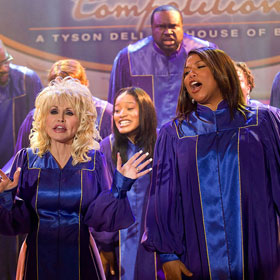What This Year's Best Picture Contenders Can Learn From 'Joyful Noise'
A recent article in The Atlantic Monthly justifiably called the month of January "the dumping ground" of the movie industry, a wasteland reserved for films so bad there's not a chance in hell they could be nominated for an Oscar, nor could they compete with the likes of Mission: Impossible and Sherlock Holmes 2 vying for big holiday crowds. The Devil Inside, Contraband, Underworld: Awakening — these are but a few of the January-release titles which, arguably for good reason, spur so little faith in movie execs.
Joyful Noise, a film that hit theaters on Friday, January 13, needs little more introduction than mention of its two biggest stars — Queen Latifah and Dolly Parton — women known for their very large … um … singing voices and even larger … er … personalities. With slim blockbuster potential and a premise cooked up for a Glee-loving teen audience (yes, it's about a singing competition), Joyful Noise at first glance seems tailor-made for January. After seeing the film, however, and love love loving it, I can't help but wish it had been released a month earlier — right along with War Horse and The Girl with the Dragon Tattoo — so that I'd have the option of asking Academy voters to consider it for Best Picture.
No, I'm not joking. I'm dead serious.
With movies like The Descendants and The Artist, collectively called "Oscar bait," rounding up the year by appearing on Ten Best lists and sweeping up trophies, it's hard not to think of a high school graduation. Oscar bait movies are the over-privileged, over-praised honors kids lapping up their self-satisfaction in the front row because working so hard has finally paid off with the one thing they have nearly pathologically desired: recognition. Meanwhile, Contraband and Man on a Ledge are out back smoking cigarettes, actually grateful that their parents didn't show. From a coolness perspective, who would you rather be?
But I wouldn't say Joyful Noise belongs neatly in either of these two categories. As a good movie that achieves the effects it strives for, Joyful Noise fits in neither with the end-of-the-year Oscar fluff nor the January riff raff. To return to the high school metaphor, it reminds me of one of my favorite underdog films (actually, my favorite film period), Romy and Michele's High School Reunion, in which Lisa Kudrow and Mira Sorvino discover, while flipping through their clique-filled high school year book, that as teenagers they "weren't in the A group" and "weren't in the B group" and "definitely weren't in the C group." They weren't in any group.
Like Romy and Michele before (after?) them, Queen Latifah and Dolly Parton don't find themselves blending in with crowds. They are both roguish, maverick-y individuals who also happen to be immensely talented. Their careers, in music and acting, have been celebrated but bumpy, and they've often been the butt of many a joke — Parton much more so. After decades in the biz, it's safe to believe that the ups and downs of fame have changed them dramatically, but part of the magic of Joyful Noise is that you'd never guess it. Latifah still has the comedic timing and boisterous ferocity she had as Khadijah James on the '90s sitcom Living Single, and Dolly — if you squint ever so slightly — seems plucked right out of 1980's Nine to Five. Close your eyes completely and the noise you hear is joyful because it seems to be coming through a direct line from a not-so-distant past.
But I've got to be careful not to let seriousness overtake ruminations on Joyful Noise, because what it has to offer — what other smugly over-appreciated films stand to learn from it — is a very simple lesson about art and entertainment: Don't take things so gosh-darn seriously, least of all yourself! This year's frontrunner (should we throw up our hands now and just say inevitable winner?) for Best Picture is The Artist, which faithfully and skillfully recreates a bygone era in film. I don't question The Artist's technical achievements, but its conception is still a mystery to me. Why? Why go back to silence when we can have Joyful Noise, particulary when the latter has three, brand new, beautiful songs written by Parton, as well as performances by two talented young singers, Keke Palmer and Jeremy Jordan?
Playfulness, surprise, irreverence toward expectation — these are aesthetic values noticeably missing from our Oscar heavyweights, but brought to blushing, colorful life in Joyful Noise. In one scene in the film, a pair of chaste churchgoers inadvertently discover they have shy feelings for each other and indulge in a night of unrepentant pleasure. The next morning — BAM! — one of them is dead. It sounds ridiculous, but from a trick all but forbidden in Spielberg's, Fincher's and Scorsese's films a large supply of pleasure is milked.
It's not just lightheartedness that Joyful Noise brings. There's wisdom in it, too. Classic Dollyisms abound, such as, "When foxes fill the jury box, the chicken is always guilty." Not to be upstaged, Latifah puts her two cents in with, "Your train of thought makes all local stops." And one finger-wagging scene, particularly, in which Latifah "has it out" with her teenager daughter, is more honest, more instructive, more inspiring than anything you'll find in The Help.
Read more here:
Why Brad Pitt Should Not Win An Oscar
For Your Consideration: How To Improve The Best Picture Race
RELATED ARTICLES
Get the most-revealing celebrity conversations with the uInterview podcast!






Leave a comment